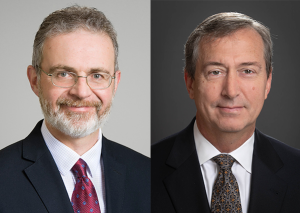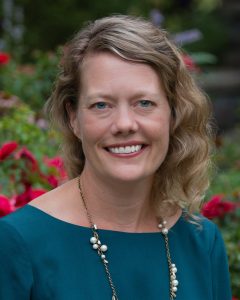Stakeholders Weigh in on IR/DR Certification Model
By John A. Kaufman, MD, MS, ABR President-elect; James B. Spies, MD, MPH, ABR Associate Executive Director for Interventional Radiology; and Brent Wagner, MD, MBA, ABR Executive Director
2025;18(1):7
 The Diagnostic Radiology Certifying Exam will be changing to an oral format in 2028. This past August, the ABR announced that it had retained a third-party healthcare communication and marketing firm to facilitate discussions with key stakeholder groups, including professional societies and program director organizations, regarding the current Interventional Radiology/Diagnostic Radiology (IR/DR) Certifying Exam. The goal was to solicit opinions and concerns about whether the certification process for IR/DR is perceived to be sufficiently equivalent to DR certification, especially as it relates to the diagnostic elements that may be a significant part of the clinical practice of those who have earned an IR/DR certificate. ABR leadership expressly stated that our role in these initial steps would be active listening and that we had not come to any conclusions about the adequacy of the status quo, existing perceptions of the interventional radiology community, the full range of challenges of the current testing paradigm, or potential solutions if change is deemed necessary.
The Diagnostic Radiology Certifying Exam will be changing to an oral format in 2028. This past August, the ABR announced that it had retained a third-party healthcare communication and marketing firm to facilitate discussions with key stakeholder groups, including professional societies and program director organizations, regarding the current Interventional Radiology/Diagnostic Radiology (IR/DR) Certifying Exam. The goal was to solicit opinions and concerns about whether the certification process for IR/DR is perceived to be sufficiently equivalent to DR certification, especially as it relates to the diagnostic elements that may be a significant part of the clinical practice of those who have earned an IR/DR certificate. ABR leadership expressly stated that our role in these initial steps would be active listening and that we had not come to any conclusions about the adequacy of the status quo, existing perceptions of the interventional radiology community, the full range of challenges of the current testing paradigm, or potential solutions if change is deemed necessary.
The process included approximately 30 remote interviews, an optional online survey that gathered opinions from association and society members, and nine online focus groups.1
The focus groups, in total, involved more than 100 participants, and there was an educational component of these meetings (attendees learned as the sessions progressed). The discussions were an important factor in helping participants formulate opinions that often evolved during the session. Often, individuals who came to the session with a belief that no change is required would end by offering suggestions for how a change might be implemented.
Among the questions posed to the groups, we asked whether there was a potential imbalance created by the planned introduction of the new DR Oral Certifying Exam and, if so, whether the imbalance would create the need for change in the IR/DR certification process.
There were general trends, with near universal support of the appropriateness, rigor, and scope of the IR/DR Oral Certifying Exam. There was also a majority opinion that the imbalance of the DR domain coverage in the new model, when comparing the future “DR certification” to current “IR/DR certification,” could create the perception that some modification was needed to the DR portion of the IR/DR exam process. A wide range of opinions were offered regarding what those modifications might be, but the discussions during this phase were primarily intended to focus on defining the potential problem rather than crafting solutions.
We are extremely grateful for the generous involvement of a broad range of engaged, thoughtful stakeholders. Although the ABR has not reached any conclusions on what, if anything, might be done, we will give at least two years’ notice before any significant change to our exam process is implemented for IR/DR certification. We remain committed to offering credible specialty certification that provides significant value to our diplomates and the patients they serve.
1Invited groups included leadership from the American College of Radiology, Women in Interventional Radiology, Society of Interventional Radiology (SIR), Association of Program Directors in Radiology, Association of Program Directors in Interventional Radiology, Association of Chiefs in Interventional Radiology, ABR IR/DR volunteer oral examiner panels, SIR Early Career Section, SIR Resident and Fellow Section, and the Residency Review Committee of the Accreditation Council for Graduate Medical Education.
Oral Exam Format Highly Valuable for Assessing Candidates
By Matthew B. Podgorsak, PhD, ABR Board of Trustees Chair, and Brent Wagner, MD, MBA, ABR Executive Director
2025;18(1):5
 The ABR mission includes assessment of knowledge in the four radiologic disciplines (diagnostic radiology, interventional radiology, medical physics, and radiation oncology). Various exam models are used by medical certifying boards; the ABR employs a multiple-choice format for the qualifying exams (typically taken during training) and an oral exam for the certifying exam (offered after completion of training). Radiation oncology, medical physics, and interventional radiology have used certifying oral exams for decades. Following a hiatus of approximately 15 years, diagnostic radiology will return to an oral exam in 2028.
The ABR mission includes assessment of knowledge in the four radiologic disciplines (diagnostic radiology, interventional radiology, medical physics, and radiation oncology). Various exam models are used by medical certifying boards; the ABR employs a multiple-choice format for the qualifying exams (typically taken during training) and an oral exam for the certifying exam (offered after completion of training). Radiation oncology, medical physics, and interventional radiology have used certifying oral exams for decades. Following a hiatus of approximately 15 years, diagnostic radiology will return to an oral exam in 2028.
Since 2021, the ABR oral exam platform has used a videoconference format that includes screen-sharing for relevant images. The session allows a one-on-one discussion between the examiner and the candidate. Each candidate interacts with four to eight examiners (depending on the specific discipline) who individually commit to a score on their portion of the exam. The group of examiners who interacted with an individual candidate during an exam session subsequently arrive at a decision (pass, fail, or conditional pass) together. The process allows for minor shortcomings in one area to be offset by exceptional performance in other sessions when the final decision is made.
Multiple-choice exams are efficient and predictable in assessing fundamentals of knowledge and comprehension, whereas oral exams are important in assessing application of knowledge, analysis, and evaluation. Oral exams focus on elements of the knowledge and skill domain that are closely related to clinical practice, including problem solving and communication. They also allow certification candidates to demonstrate the breadth of their knowledge beyond rote memorization.
Committees of subject matter experts create standard case sets and pre-established expectations of performance elements that represent competence in the field. On exam day, group discussions among these experts after the exam sessions are completed help to normalize the criteria and minimize outlier scoring determinations by individual examiners. However, similar to the way a patient or a clinical colleague might judge the competence of a radiologist, radiation oncologist, or medical physicist, the examiners employ a level of subjectivity in their assessment. Medical care is often complicated; unlike multiple-choice exams, oral exams allow candidates to express judgment when offering thoughtful conclusions in the setting of nuanced circumstances. The result is a highly reproducible exam that allows candidates for certification to demonstrate the knowledge and skill they have acquired through rigorous training and study and reassures the public of the high standards associated with board certification.
ABR Trustee Follows Mentors to Leadership Role on Board
By Kate Maturen, MD, ABR Trustee
2025;18(1):6
In late 2024, I had the distinct honor of succeeding Stephen Simoneaux, MD, as vice chair for diagnostic radiology (DR) on the ABR Board of Trustees (BOT). An eminent pediatric radiologist and ABR volunteer of many decades, Steve will take his signature good humor and practical wisdom to the Board of Governors (BOG) in 2025. Congratulations, Steve, and thank you for your service to the BOT!
I was a new faculty member at the University of Michigan in 2010. About five minutes after receiving my ID badge and pager, I was recruited as an ABR volunteer. My department chair, Reed Dunnick, MD, (former ABR Trustee, board president, and associate executive director) asked me to write GU items for the DR Certifying Exam, then in gestation. The process of winding down the “Old Orals” had begun, and the new written exam was known as the “Exam of the Future.” Reed was and is a terrific mentor, and his enthusiasm for ABR volunteering was truly infectious. Brent Wagner, MD, MBA, (current ABR executive director) was my engaging committee chair, and the die was cast. I was to be an ABR lifer.
Later, as an oral examiner and GU category chair, I felt welcomed and supported by many other chairs and Trustees. Desiree Morgan, MD, (Governor and former BOT vice chair for DR) was especially helpful in encouraging me to expand my ABR involvement. Thank you to all these mentors, sponsors, and role models!
What’s old is new again, and we are returning to a DR Oral Certifying Exam in 2028. The ABR is your organization, and we are accountable to the radiology community and to the public. Incorporating robust input from radiology practice leaders, educators, and trainees, we will empanel the new DR oral certifying item-writing committees in 2025 and spend 2026-27 creating a large bank of novel items with new, high-quality images. In 2027, we will marshal and train many of you to participate as remote oral examiners, then launch the “New Orals” in 2028. Interventional radiology, radiation oncology, and medical physics have run remote oral exams since 2020, and DR will benefit from their experience and the operational expertise of the ABR staff as we roll out the largest remote exam in the organization’s portfolio.
The “Old Orals” have faded from collective memory among residents, but many have understandable anxiety about this change. Residents, you probably won’t believe me until after your exam in 2028, but it’s not nearly as scary as you may think. This is what you’ve trained for! The examiners are eager to help you show what you know. The images will be chosen to be as clear as possible. The diagnoses will be selected for their importance and clinical relevance. The exam will focus on higher level observation, management, and communication skills. Future examinees can learn more about the new exam on our website and watch a mock session.
The ABR is about people, and you know these people. They may be your teachers, colleagues, or former trainees. They are volunteering their time and expertise to further our profession, and this sense of mission and shared purpose is evident in every committee, the BOT, and the BOG. It is a true honor to serve in a leadership role for groups like these, with the highly capable and attentive support of the ABR staff. I greatly appreciate this opportunity and I’m looking forward to the work ahead.



